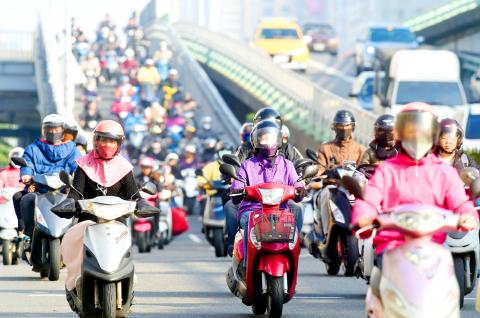The Executive Yuan has approved an amendment to the Air Pollution Control Act (空氣污染防制法) to increase penalties and their applicability, with a particulate pollutant reduction goal expected to be achieved by mid-2019 ahead of schedule.
In terms of factory emissions, the amendment would impose stricter control of production processes to reduce volatile organic compound pollution, lower the sulfur content of fuels, ensure stricter factory emissions requirements and allow authorities to fine polluters by the number of violations discovered instead of by the number of days when pollution violations are discovered.
In terms of vehicle emissions, the amendment would authorize local governments to set up “air quality zones” where highly polluting vehicles are banned, put more vehicles under regulations — including ships and factory machinery — and impose stricter emissions standards for vehicles more than 10 years old.

Photo: Chang Chung-yi, Taipei Times
The maximum fine for air pollution would be raised from NT$1 million to NT$20 million (US$33,327 to US$666,533), while the government would be allowed confiscate illegal gains from polluters. The fine would also be extended from just polluters to their supervisors and company directors.
The amendment would also established a mechanism to encourage and protect whistle-blowers.
The Cabinet is to announce a set of pollution prevention measures next week.
Environmental Protection Administration Minister Lee Ying-yuan (李應元) said the amendment and ensuing pollution control measures are expected to achieve a pollution reduction goal by mid-2019, earlier than scheduled, if the measures are thoroughly enforced.
Then-premier Lin Chuan (林全) in April announced the goal to reduce the level of PM2.5 — an indicator of fine particulate matter measuring 2.5 micrometers or less — from 22 micrometers per cubic meter to 18 micrometers per cubic meter by the end of 2019.
The number of “red alert” peak pollution days is to be reduced by 20 percent in two years and by 50 percent in four years, Lee said.
The agency is also to introduce more stringent emissions requirements by July 2020 targeting vehicles more than 10 years old that would no longer be tied to the emissions standards when the vehicles were manufactured, he said.
The agency has offered subsidies to retire 1.2 million two-stroke engine motorcycles and 80,000 diesel vehicles manufactured before 1999, it said.
“There are 14 million motorcycles in the nation. If 10 percent [of motorists] have the awareness to use public transportation during peak pollution periods ... it would make considerable changes. People must have that awareness,” Lee said.
New pollution prevention measures to be proposed include banning field burning of agricultural residue and regulating diesel generators used by farmers and street vendors, the agency said.
The nation is to stop using petroleum coke — whose sulfur content exceeds that of coal by more than 10 times — by July next year, when Formosa Plastics Group’s naphtha cracker in Yunlin County stops using the substance to fire its power plants, Lee said.

‘DENIAL DEFENSE’: The US would increase its military presence with uncrewed ships, and submarines, while boosting defense in the Indo-Pacific, a Pete Hegseth memo said The US is reorienting its military strategy to focus primarily on deterring a potential Chinese invasion of Taiwan, a memo signed by US Secretary of Defense Pete Hegseth showed. The memo also called on Taiwan to increase its defense spending. The document, known as the “Interim National Defense Strategic Guidance,” was distributed this month and detailed the national defense plans of US President Donald Trump’s administration, an article in the Washington Post said on Saturday. It outlines how the US can prepare for a potential war with China and defend itself from threats in the “near abroad,” including Greenland and the Panama

The Chinese Nationalist Party (KMT) is maintaining close ties with Beijing, the Democratic Progressive Party (DPP) said yesterday, hours after a new round of Chinese military drills in the Taiwan Strait began. Political parties in a democracy have a responsibility to be loyal to the nation and defend its sovereignty, DPP spokesman Justin Wu (吳崢) told a news conference in Taipei. His comments came hours after Beijing announced via Chinese state media that the Chinese People’s Liberation Army’s Eastern Theater Command was holding large-scale drills simulating a multi-pronged attack on Taiwan. Contrary to the KMT’s claims that it is staunchly anti-communist, KMT Deputy

RESPONSE: The government would investigate incidents of Taiwanese entertainers in China promoting CCP propaganda online in contravention of the law, the source said Taiwanese entertainers living in China who are found to have contravened cross-strait regulations or collaborated with the Chinese Communist Party (CCP) could be subject to fines, a source said on Sunday. Several Taiwanese entertainers have posted on the social media platform Sina Weibo saying that Taiwan “must be returned” to China, and sharing news articles from Chinese state media. In response, the Mainland Affairs Council (MAC) has asked the Ministry of Culture to investigate whether the entertainers had contravened any laws, and asked for them to be questioned upon their return to Taiwan, an official familiar with the matter said. To curb repeated

Myanmar has turned down an offer of assistance from Taiwanese search-and-rescue teams after a magnitude 7.7 earthquake struck the nation on Friday last week, saying other international aid is sufficient, the National Fire Agency said yesterday. More than 1,700 have been killed and 3,400 injured in the quake that struck near the central Myanmar city of Mandalay early on Friday afternoon, followed minutes later by a magnitude 6.7 aftershock. Worldwide, 13 international search-and-rescue teams have been deployed, with another 13 teams mobilizing, the agency said. Taiwan’s search-and-rescue teams were on standby, but have since been told to stand down, as